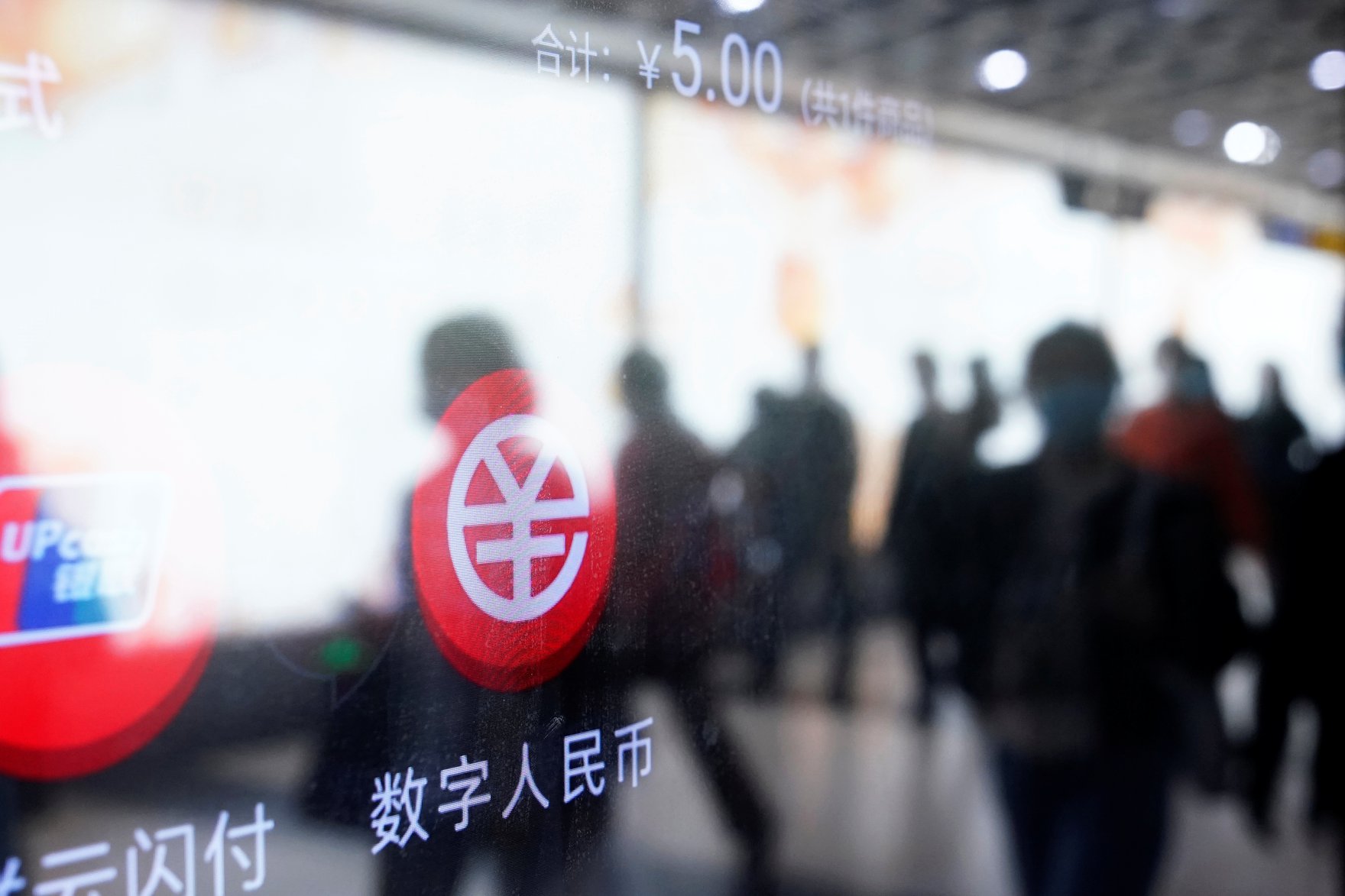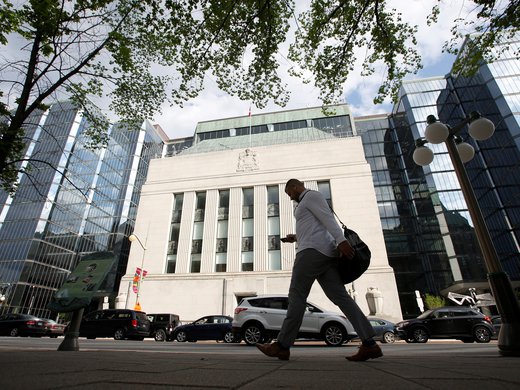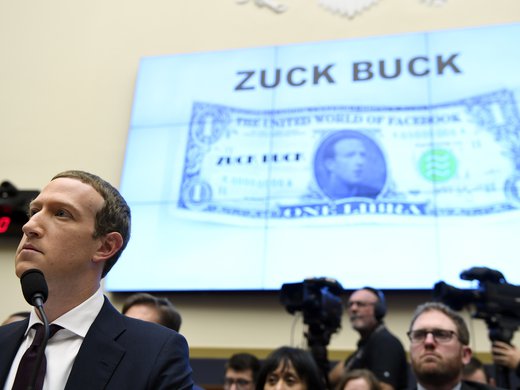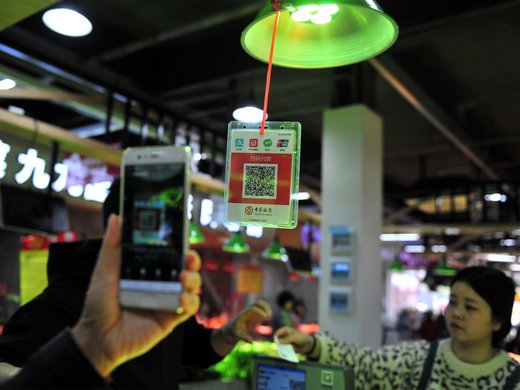Good reasons abound to worry about the challenges posed by China, but so do bad reasons. Among those causing excessive hyperventilation is China’s launch of a digital form of the renminbi.
By being the first among major countries to mint cash digitally, China could spy on financial transactions all over the world and deal a blow to US power by making the renminbi the dominant international currency — or so it’s claimed.
These fears are malarkey, to borrow one of US President Joseph Biden’s favourite words. Some officials in Biden’s administration are reportedly “concerned” about the issue, and are eager to understand how China’s digital currency will work. Once they do, they — and their counterparts in other major governments — will, it’s hoped, dismiss the scaremongers, who are clamouring for governments to counter Beijing’s initiative by rushing out digital dollars, euros, yen and pounds.
China is unquestionably far ahead in developing this new kind of money, which enables people to pay each other directly and with legal tender, as with cash — but by using electronic transmission, typically on mobile phones. Unlike payment apps such as Venmo, run by companies that act as intermediaries, or cryptocurrencies such as bitcoin, which aren’t legal tender, the digital renminbi is issued and controlled by the nation’s central bank, the People’s Bank of China (PBOC). Chinese officials call it DC/EP, which stands for digital currency/electronic payment, or more colloquially, e-yuan. (“Yuan” is the unit of account for prices in renminbi, although the two terms are used interchangeably.)
A handful of other countries, including the Bahamas, have already issued their own versions of this monetary innovation, which is generically called central bank digital currency (CBDC). But no other big powers have taken the concept as far as China, where consumers and merchants are already accustomed to paying for all sorts of items by flashing their mobile phones, mostly by using apps run by Chinese financial giants such as Alipay and WeChat Pay that are linked to bank accounts. Pilot programs for DC/EP are under way in several Chinese metropolises, and officials have suggested that by the time of the 2022 Olympic Games the e-yuan will be more broadly available, including for foreign visitors.
Such assertions exemplify a fallacy about China that has increasingly taken hold in Washington and other world capitals: that Beijing is bent on global domination with the ultimate goal of imposing its authoritarian system far and wide.
This is a country where the state uses millions of cameras in public spaces, as well as geolocation and facial recognition technologies, to keep a sharp eye on its 1.4 billion citizens. With DC/EP, the authorities will be able to track any individual payments involving the currency, and although PBOC officials vow that this will happen only when criminal activities such as tax evasion and money laundering are suspected, the definition of “crime” in China can encompass political dissidence.
Alarm bells are therefore clanging abroad, in a spate of recent op-eds, think tank reports, and books. As Akram Keram wrote in an early March 2021 op-ed for The Washington Post, “If digital yuan reaches beyond China[’s] borders, as WeChat and Zoom did, it will become another censorship or filtering digital tool to monitor people's financial life in foreign countries.”
And to quote Nik Bhatia in his book Layered Money, “DCEP carries the potential to be the largest financial surveillance operation in the world, especially if it forces its major trading partners into using DCEP to transact with Chinese entities.”
And perhaps most alarming, Morgan Beller wrote in The Information in February that “there are only three certainties in life: death, taxes and buying things from China. China can require that any trading partners of Chinese companies complete transactions in DCEP. If you want goods from China, you buy them with DCEP....With control of that infrastructure, China would have ... an unprecedented tool for monitoring individuals' activities wherever they are.”
Such assertions exemplify a fallacy about China that has increasingly taken hold in Washington and other world capitals: that Beijing is bent on global domination with the ultimate goal of imposing its authoritarian system far and wide. To be sure, the Chinese Communist Party (CCP) acts ruthlessly in inducing obedience and loyalty from the nation’s citizens; Beijing also bullies other countries — mostly in Asia, but also elsewhere — into accepting Chinese positions on a host of issues it deems crucial to its regime’s security. But that is a different sort of challenge from a worldwide threat to liberal democracy.
Even if China did harbour ambitions to extend Orwellian control internationally, the idea that it could use the digital renminbi for pervasive snooping abroad is based on misconceptions about how money works, especially across borders.
Take the case of a shopper buying, say, a Chinese-made TV in Canada. Payment is almost invariably in Canadian dollars, which is what Canadian retailers expect and may insist upon; although some will accept payment in other currencies for the convenience of foreign customers, they typically exchange them into Canadian dollars for paying their employees, utility bills and so forth.
Perhaps the company importing the TV from China would pay the supplier in renminbi, and conceivably such payments will be made in the future in DC/EP. But that hardly means the Canadians involved would hold DC/EP for their personal use. They don’t keep renminbi now, since they have scant use for it in Canada, and if for some reason they got some DC/EP, they would just convert it to Canadian dollars and, at the very least, be cautious about how they used it, given the obvious privacy issues.
What about Chinese tourists venturing overseas who want to pay their bills in DC/EP? Again, it is hard to see why the DC/EP would end up being held for very long by foreign individuals, who would presumably want to convert it promptly into their local currencies. But what about, say, a developing country where citizens lack faith in the local currency and start using DC/EP instead? Even in such a case, the information Chinese spies could extract would be extremely limited in value, if not worthless. Compromising transactions — say, payments for illegal activities or bribes — wouldn’t be conducted in DC/EP any more than they are with credit cards; people engaging in such activities use cash or a cryptocurrency like bitcoin.
Another, related scare story about the digital renminbi is that because the United States is so far behind China in developing a CBDC, the US dollar will lose the unique international status that it has held for the better part of a century. This would be quite a reversal. The greenback accounts for nearly 60 percent of the reserves held by the world’s central banks (compared to a little over two percent for the renminbi). The dollar is also prevalent as a medium of exchange in global trade, even cross-border commerce that doesn’t touch US shores; roughly 40 percent of international payments in recent years have been conducted in dollars (versus, again, about two percent for the renminbi). The widespread holding of dollars and dollar-denominated securities confers benefits on Washington, most famously the “exorbitant privilege” that enables America to obtain cheap capital from abroad to help fund the federal government’s deficit and US consumers’ purchases of imports.
China has long complained about various problems associated with dollar hegemony, and the rollout of the DC/EP is stirring anxiety that Beijing has devised a greenback-killer. “The rapid digitalisation of the renminbi. … could be the key that accelerates the decline of the dollar’s dominance as the world’s leading reserve currency,” according to Michael Hasentab, the chief investment officer for Templeton Global Macro, in a Financial Times op-ed this month. In a like vein, Michael Greenwald, a former US Treasury official, frets on the Atlantic Council’s website: “It is essential that the United States avoid complacency and successfully establish a digital currency before China. … [Otherwise], it may risk its hard-earned, historical economic superiority.”
In past decades, such prophecies of doom for the dollar have been frequent — and wrong. The ballyhoo over China’s DC/EP shows no promise of leading to a different outcome, for the simple reason that the renminbi lacks many of the features that make the dollar appealing for foreigners to hold. Whereas capital can move with near-total freedom in and out of the United States, Beijing has long restricted capital flows, both inward and outward. Although China’s financial regulations have been significantly loosened in recent years, and the government’s five-year plans call for internationalization of the renminbi, the nation’s rulers are instinctively fearful of the instability that can come with untrammelled money movements. Anyone buying renminbi — digital or otherwise — must reckon with the possibility that Beijing might clamp down anew, preventing foreigners from transferring or disposing of their Chinese assets as they wish.
A dominant currency, the kind central banks want to hold in reserve, is one that people turn to in a financial crisis for safety and liquidity, to ensure they can readily obtain cash to meet obligations coming due. No Chinese security can match US Treasury bills in that regard, especially given well-known deficiencies in China’s rule of law. Nor is the PBOC capable of instilling the kind of confidence investors have in the US Federal Reserve as “global lender of last resort” that provides trading partners with plenty of dollars in the event of financial turmoil.
If China were to adopt financial reforms that upended its model of tight political and economic management, and embrace rule of law to the point that its judicial system was less subservient to the CCP, the dollar might well face a serious challenge. But in the absence of such transformative steps, digitalization alone will be grossly insufficient to topple the US currency from its perch.
Even so, perhaps DC/EP could work as a sanctions-buster, some observers conjecture. The United States has used the dollar’s clout to impose sanctions on adversaries such as Iran, which Washington cut off from access to greenbacks that Iranian companies and banks need to conduct international commerce. This weapon has also been wielded against China, an example being an August 2020 executive order by then-President Donald Trump putting Hong Kong chief executive Carrie Lam and others on a list of sanctioned officials accused of undermining Hong Kong’s autonomy. Lam has lost access to banking services as a result — even Chinese banks are loath to risk being frozen out of dollar markets for violating US law — and she receives her salary in cash.
Beijing’s resentment over Washington’s deployment of this foreign policy tool is no secret, and at first glance it might seem that DC/EP could help would-be sanctions evaders by providing a high-tech system for making payments outside the dollar-centred financial system. But the long arm of US sanctions enforcement is not so easy to circumvent. American intelligence agencies can use a variety of sources and methods to detect companies doing business with sanctions targets, and as the Lam case indicates, fear of punishment is often a sufficient deterrent.
Why, then, is China pushing ahead with DC/EP? Its main motivations are almost certainly domestic. The explosive growth of Alibaba and Tencent, the companies that control Alipay and WeChat Pay, has given them more power over payments and credit in the Chinese market than the country’s regulators are comfortable with. Authorities reportedly want a competitive tool that will check the financial giants’ clout and help traditional banks preserve their roles as allocators of credit.
Domestic considerations ought to be foremost in the CBDC policy-making process for the United States and other major governments as well. CBDCs pose a host of thorny dilemmas. How should consumers’ right to privacy be balanced against legitimate requirements of law enforcement agencies? How should the banking sector be involved in distributing CBDC, and, since people may find CBDC more attractive than bank deposits during times of turmoil, how much should individuals be allowed to hold without putting banks at risk?
The resolution of these and other issues should determine how rapidly CBDC is rolled out. China-related bugbears can be safely ignored.




